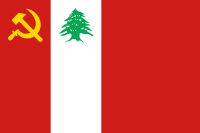Lebanese Communist Party
| Parti communiste libanais Lebanese Communist Party |
|
|---|---|
| Party leader | Khaled Hadadah |
| founding | 1924 as Syrian-Lebanese CP |
| resolution | 1925 to 1943 |
| Headquarters | Beirut , Lebanon |
| Alignment | Communism , Marxism-Leninism |
| Colours) | red |
| Number of members | 13,000 |
| International connections | Communist International , International Meeting of Communist and Workers' Parties |
| Website |
lcparty.org jammoul.net |
The Communist Party of Lebanon (KPL, Arabic الحزب الشيوعي اللبناني, DMG al-ḥizb aš-šuyūʿī al-lubnānī , also often known as the French Parti communiste libanais , PCL) is a Marxist and communist party in Lebanon .
It has never developed into a mass organization, but it has influenced some intellectuals. Its influence on Lebanese politics is rather small, but next to the closely connected Hezbollah it is the second largest camp of the Lebanese opposition group Résistance Nationale Lebanaise ("National Lebanese Resistance"). The party has an armed wing. Its general secretary is Khaled Hadadah .
history
The Lebanese Communist Party is one of the oldest non-denominational parties in Lebanon and evolved from the Syrian-Lebanese Communist Party in 1944 , alongside the Syrian Communist Party .
During the first two decades after Lebanese independence , the party experienced little success. In 1943 the party took part in the elections to the National Assembly, but did not win a seat. All of its candidates were also defeated in the 1947 elections and in 1948 the party was banned. During the 1950s, the organization's position on Arab nationalism and the political movement of Gamal Abdel Nasser was changeable and the party lost support as a result.
During the Lebanon crisis in 1958 , the party was on the side of the government opponents. In 1965, the Lebanese communists ended their isolation and joined the Front pour parties progressives et forces nationales , which later became the Lebanese national movement under Kamal Jumblat , the leader of the Druze .
In 1970 the LKP was legalized by Interior Minister Kamal Dschumblat and allowed to participate in the 1972 elections. Although the party won a few thousand votes, it was unable to obtain a parliamentary seat due to the complicated allocation of seats. However, the party's importance grew with the onset of tensions in Lebanon in the mid-1970s.
In the civil war
In the early 1970s, the KPL set up a militia known as the People's Guard , which took an active part in the fighting in 1975 and 1976, which marked the start of the Lebanese Civil War (1975–1990). During this civil war, the KPL was part of the alliance between the Lebanese National Movement and the PLO and later other Muslim groups, although many of the members were Christians .
During the 1980s, the LKP increasingly lost strength. In 1983, 50 of its members were reportedly executed in Tripoli by members of the Sunni Tawhid movement . In 1987 the People's Guard fought alongside the Druze PSP for a week in West Beirut against units of the Shiite Amal militia . These battles were only ended with the intervention of Syrian troops .
Also in 1987, the organization wanted to remove its Greek Orthodox leader George Hawi at its fifth party congress and replace it with the Shiite Karim Murrawwah , but the pressure from Syria received Hawi in his office. Hawi was a supporter of Syria and had become unpopular because he spent more time in Damascus than in Lebanon. Murrawwah was one of the most influential members of the KPL at the time and got on well with Shiite groups in West Beirut. However, several leading party members fell victim to attacks attributed to Islamic fundamentalists between 1984 and 1987 .
Modern times
In June 2005, George Hawi stated in an interview with the pan-Arab news broadcaster al-Jazeera that Rifaat al-Assad , the brother of the former Syrian President Hafiz al-Assad and uncle of the current head of state Bashar al-Assad , was behind the attack on Kamal Jumblat Was stuck in 1977. On June 21, 2005, Hawi was killed in a car bomb attack. Syria is also associated with this act.
After the Cedar Revolution , the KPL advocated a Lebanon that was sovereign from outside influences. In the period that followed, the alliance with the Shiite-Islamist Hezbollah grew stronger. In 2006 members of the party took part in the July war against the Israeli invasion of southern Lebanon. At least 12 of their supporters were killed.
Web links
- Official website (Arabic, English, French)
